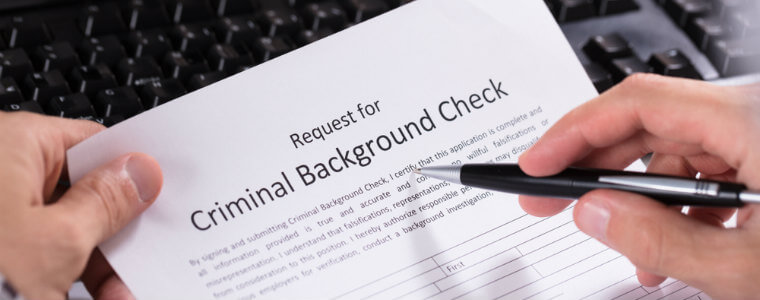How Far Back Does a Criminal Background Check Go?
A criminal background check can potentially uncover a person’s complete criminal history, ranging from arrests to convictions to incarcerations. However, how far back a background check goes largely depends on the type of check being performed, the jurisdiction in which the crimes occurred, and the amount of time that has passed since the offenses took place.
Generally speaking, a comprehensive criminal background check could go back indefinitely in search of an individual’s run-ins with the law. But for many common types of employment and housing background checks, records are only searched back 7 to 10 years.
What is Included in a Criminal Background Check?
A full criminal background check will include a search of an individual’s history in the following categories:
Arrest Records
An arrest record is created any time a person is apprehended or taken into custody by law enforcement on suspicion of a crime. An arrest is not a conviction, but it still appears on a person’s rap sheet and is part of the criminal record.
Court Records
This includes records related to any charges filed, including the charges themselves, court dates, pre-trial motions, plea bargains, verdicts, sentencing details, appeals filed, and more.
Incarceration Records
If an individual is convicted and sentenced to a term in jail or prison, details on the length of sentence and time served will appear here. Records about probation and parole may also be included.
Factors That Determine How Far Back a Check Goes
There are a few key factors that influence how far into a person’s past a background check inquiry will reach:
Type of Background Check
There are numerous different types of background checks that can be conducted, ranging from basic checks that look for criminal convictions to much more comprehensive checks that include arrest records and non-conviction charges. Basic checks only go back 7 years in most cases while more advanced checks can technically dig up a lifetime of offenses.
Jurisdiction
Laws regarding criminal record reporting and retention vary widely across states, counties, and cities. Some jurisdictions only keep digital records back 7-10 years while others have arrest records dating back 50+ years accessible online. Searches in limited jurisdictions won’t go back as far as those with open access to records.
Age of Offender
Background checks take an individual’s age into account. Checks for juveniles will generally only search back a few years while those for older adults may search back decades.
How Long Different Types of Records Are Kept
The length of time each type of criminal record is retained also depends on the jurisdiction. But generally:
Arrest Records
Arrest records are usually retained indefinitely, though they can be expunged or sealed. Most states make arrest records available digitally at least going back 10 years if not more.
Court Records
Courts preserve case files indefinitely in most states, though storage practices can limit accessibility past 10-20 years. Conviction records in particular tend to stay available for background checks indefinitely.
Corrections Records
Records related to incarceration, parole, and probation are kept indefinitely in most cases. These details provide verification that a sentence was carried out.
State Differences in Criminal Record Reporting
Each state has its own laws dictating what criminal records can legally be included on a background check report. There are a few broad categories:
States That Allow Unlimited Lookback Periods
A small number of states including Delaware, Georgia, and New York place no limits on how far back into an individual’s criminal history a background check can search. All available records, even decades-old offenses, may be reported.
States With Limited Lookback Periods
Most states allow only a set number of years to be searched for non-conviction records like arrests and dismissed cases. Time limits range from 5 years (Utah) to 15 years (Texas). Convictions can still usually be reported indefinitely.
When Criminal Histories Can Be Expunged
One circumstance that can limit the reach of a background check is if qualified charges are expunged or cleared from the offender’s record.
Expungement Laws By State
Over 30 states have passed laws allowing for expungement and record sealing under certain conditions. The crimes eligible, waiting periods, and application processes vary.
Expungement Process
Getting charges expunged removes them from the applicant’s rap sheet and legally prohibits reporting them on background checks. However, the process is time-consuming, restrictive, and not always permanent. Records may still exist in archives.
Conclusion
In summary, conducting a background check beyond 7-10 years becomes increasingly difficult and unreliable. While past arrest and court data may technically be accessible in state archives, most checks do not delve further into the past than allowed by the Fair Credit Reporting Act guidelines.
Going back more than a decade often requires intensive manual research, so for practical purposes background checks typically stick to the previous 7-15 years depending on state laws. However, certain states and positions may justify more extensive inquiries.
Frequently Asked Questions
How far back does a federal background check go?
There is no federal statute limiting the time scope of federal background checks, so they can technically go back indefinitely. But checks for government positions still tend to focus on the previous 7-10 years.
Can a background check find expunged records?
Most states prohibit reporting of expunged charges on background checks. However, they may still appear in certain databases. Thorough checks may find indications of expunged records.
Do all states have the same rules for background check lookback periods?
No, states have widely varying laws around criminal record reporting and retention. Some states allow unlimited history while others restrict reporting of non-convictions after 7 years.
What if you lived in different states?
When applicants have lived in multiple states, each state’s laws apply to the portion of criminal history accrued there. So time limits can vary for records spanning different jurisdictions.
Can employers do their own background checks?
Yes, employers can choose run their own internal checks but these may not be as far-reaching as those done by licensed screening agencies that have access to more records.







